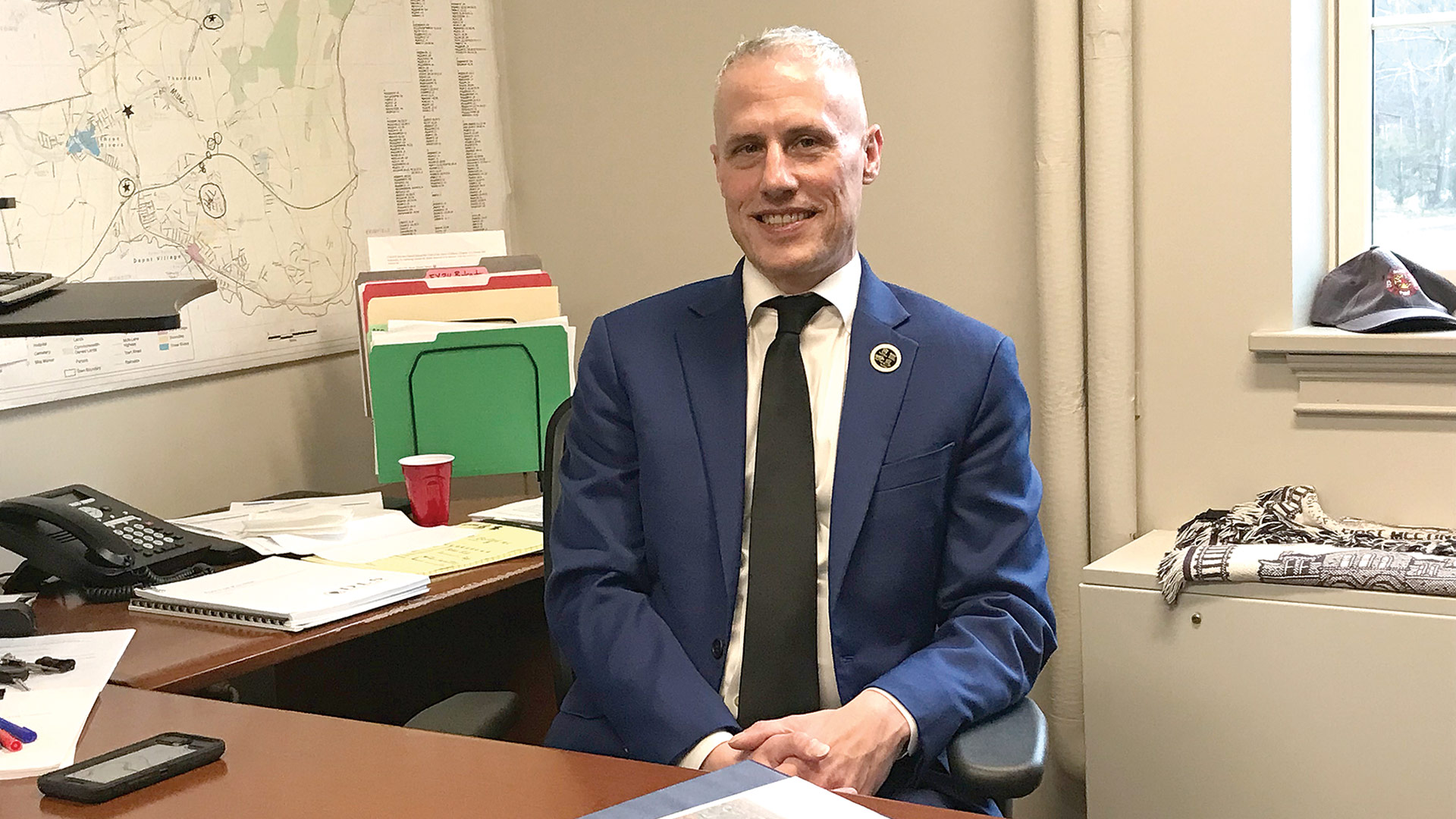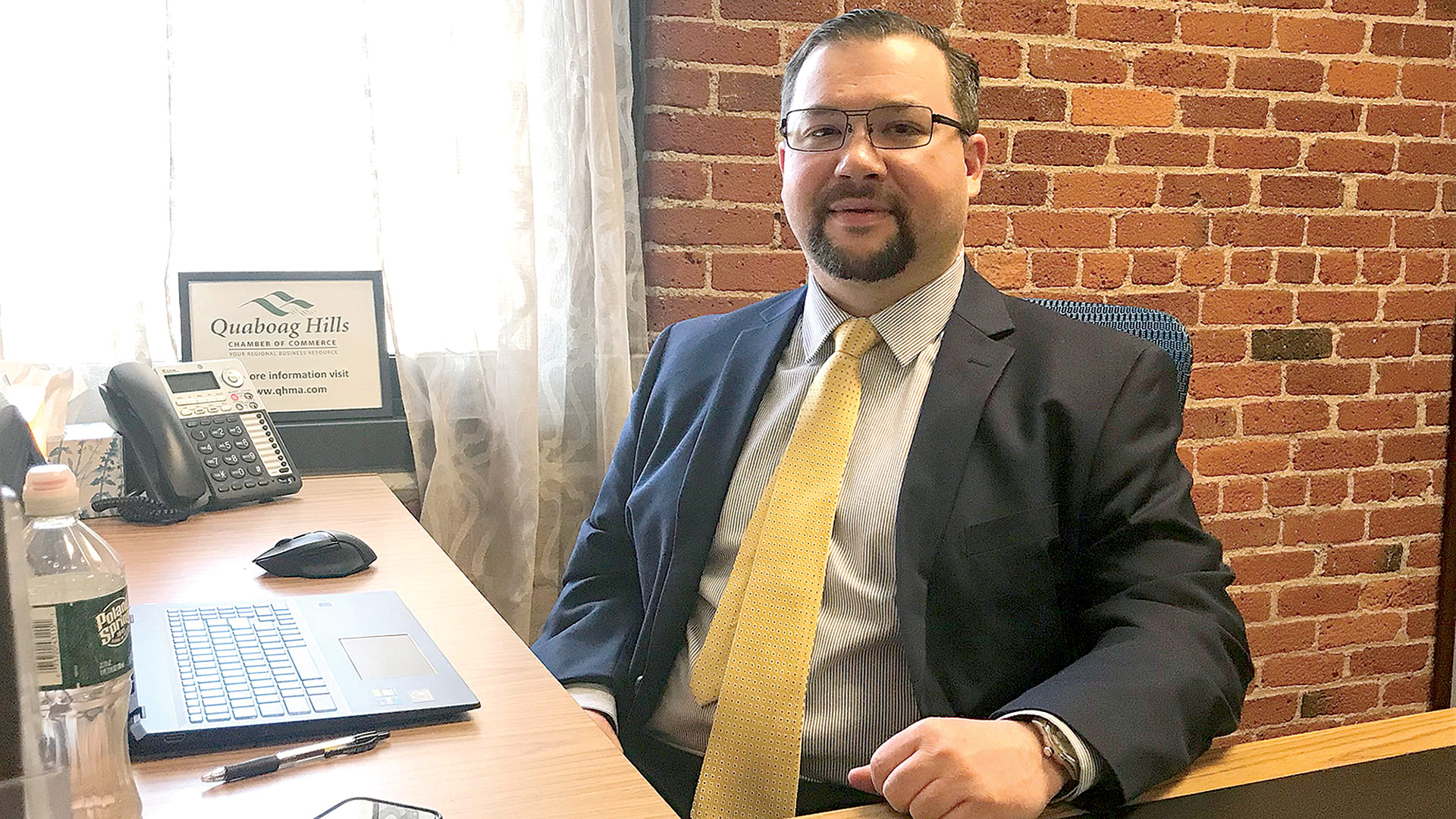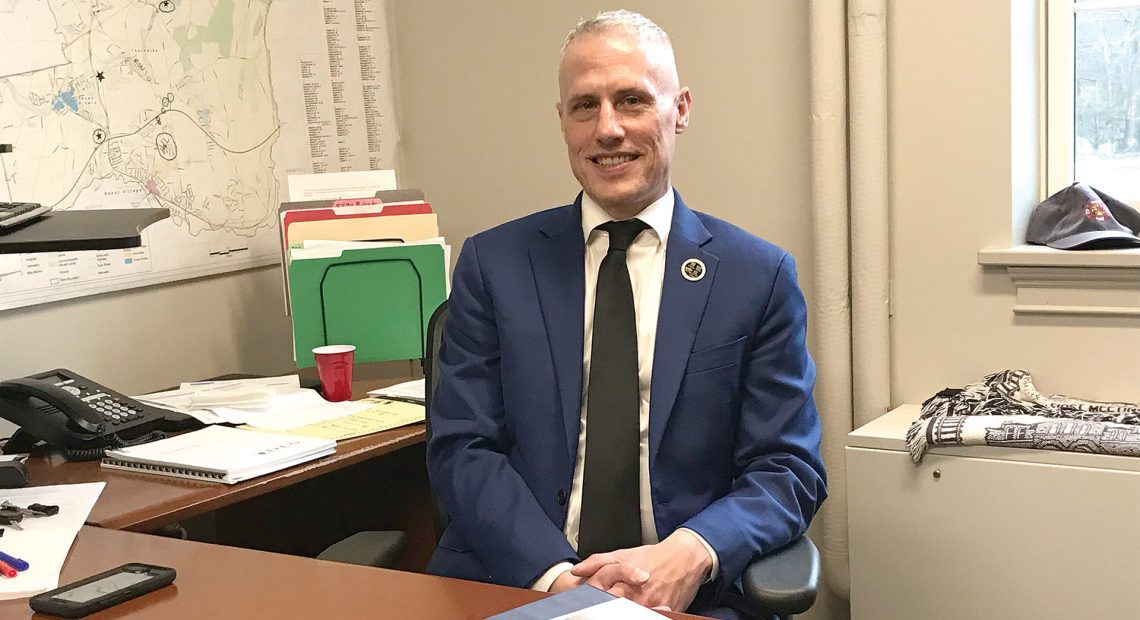Community Spotlight
By Mark Morris

Ryan McNutt says the ‘hill’ off Palmer’s Mass Pike exit is a challenging site.
You might say Ryan McNutt is a man with a plan. The Palmer town manager keeps a copy of the town’s master plan on his desk for anyone who wants to know the projects and priorities for the community in the years ahead.
McNutt sees a real benefit in a formal plan because it reduces what can be an overwhelming world of choices.
“When you have a document that we’ve all agreed on, it allows us to work toward the different benchmarks that are laid out for us,” he said. “Having a plan just makes it easier to get things done.”
And there are a lot of initiatives that developers, the town, and the state are trying to get done in Palmer — everything from a hotel and water park on the site once proposed for a casino to a stop on the planned, and highly anticipated, east-west rail line; from new cannabis businesses and a brewery to some infrastructure projects, and much more.
Overall, it’s an intriguing tome for this town roughly halfway between Springfield and Worcester, one that could change the landscape in all kinds of ways.
One key benchmark involves developing the land near Exit 63 on the Massachusetts Turnpike, commonly known as the Palmer exit.
With several empty land parcels near the exit ramp, McNutt and others see this as a significant economic opportunity. He was prepared to have the town purchase one of the parcels, clean up the lot, and advertise it for development with the hope it would be a catalyst for others.
“When you have a document that we’ve all agreed on, it allows us to work toward the different benchmarks that are laid out for us. Having a plan just makes it easier to get things done.”
While planning that move, a developer bought the parcel from the current owner and signed on to build the Liberty Plaza, scheduled to open late next year. Committed retail stores include a Chipotle restaurant, Starbucks, Jersey Mike’s Subs, and two other retail spaces not yet finalized.
“This is a great success for the town because it turns an empty lot into the kind of plaza you would expect to see close to a turnpike exit,” McNutt said. “Best of all, we achieved the result we wanted without having to buy anything.”
But this project pales in comparison to another proposed project, one that involves development of an area known as the ‘hill.’ Located directly at the end of the turnpike exit, the parcel represents nearly 200 acres of land. It was this area that was the proposed site for a casino complex.
According to Quabog Hills Chamber of Commerce Executive Director Andrew Surprise, Kalahari Resorts is in discussion with the town about a potential 400- to 500-room hotel with an indoor water park. Kalahari Resorts currently has hotel complexes in Pennsylvania, Ohio, Wisconsin, and Texas. Themed around African adventure, the hotels emphasize family vacations by featuring large indoor water parks, and business gatherings by offering large conference centers.

Andrew Surprise says the Quaboag Hills Chamber has rebounded following a loss of members and direction during the pandemic.
“If Kalahari eventually locates here, it would be a huge economic benefit to Palmer and the entire region,” Surprise said.
At the town level, McNutt said Palmer is working with the company to address bringing public utilities and access roads to the hill parcel.
“It’s a challenging site,” he noted. “While nothing is a sure thing, I’m glad to see this company feels optimistic enough to keep exploring the opportunity.”
Meanwhile, those in — or looking to enter — the cannabis industry are also finding opportunities in Palmer.
Indeed, while there are no cannabis retailers currently operating in town, that will soon change. Kali Cannabis has begun building a retail operation on Shearer Street, close to the turnpike exit. Cannabis retailer Silver Therapeutics has also broken ground on its facility, and two additional companies, Green Gold Group and Green Adventure, are planning retail operations in Palmer. The latter companies are still completing the permitting process with the Cannabis Control Commission.
In short order, the town could see four cannabis establishments open their doors.
“We will have to see what the market does to determine the right number of cannabis retailers,” McNutt said. “We’re going to let capitalism solve that one.”
As for the chamber, in the middle of the pandemic, it faced a shrinking membership base and a loss of direction. During that time, Surprise became the executive director, with a mandate to turn things around. After nearly three years, he is happy to report the chamber is back.
“We’ve added dozens of new members in the last two years, with more businesses signing on every day,” he said, adding that, in the past year, the chamber has brought $364,000 in economic-development money to its members.
Tracking Progress
Another engine of economic development involves a train stop in Palmer as part of the east-west rail project currently under consideration. In the budget that Gov. Maura Healey will present to the legislature for approval, she has identified funding for train stops in Pittsfield and Palmer.
“While the budget hasn’t yet passed, it’s a promising sign because it shows the Commonwealth believes in the rail project and supports Palmer,” McNutt said.
If approved, a rail stop in Palmer offers residents the possibility of direct access to Boston without driving. But Surprise looks at that potential from a different angle. “I’m more focused on bringing people from Boston and Eastern Mass. here, so they can visit the region, spend money in this area, and help our economy.”
It’s an economy that’s growing and becoming increasingly diverse, with many new additions, including cannabis-based businesses as well as the town’s first brewery, created by Rachel Rosenbloom and her husband, Michael Bedrosian, who saw opportunity in Palmer and are seizing it.
“We knew town officials were looking to revitalize downtown, and we thought it would be a good idea to add something to the community that would encourage people to go downtown,” Rosenbloom said.
While the couple have been home brewers for 10 years, Rosenbloom is a professional brewer, working at Fort Hill Brewery in Easthampton for the past five years. Palmer is known as the Town of Seven Railroads because the rail industry was an important part of the town’s early industrial development. That knowledge inspired the couple to name their business Seven Railroads Brewery.
“We didn’t want to go with an obvious name like Palmer Brewing Company,” Rosenbloom said. “We wanted to choose a name that really meant something to the community and to the area.”
Once they receive the proper construction permits for their Park Street location, the couple will start installing their brewing equipment. They have secured a license to brew and are still waiting for approval of their license to pour, which will determine how soon they can open the taproom and start serving the public.
“We’re going to concentrate on being a brewery, and while we won’t be serving food, we will invite local food trucks and let patrons know they can bring in food,” Rosenbloom said.
Palmer at a glance
Year Incorporated: 1775
Population: 12,448
Area: 32 square miles
County: Hampden
Tax Rate, residential and commercial: Palmer, $21.40; Three Rivers, $21.82; Bondsville, $22.54; Thorndike, $22.25
Median Household Income: $41,443
Median Family Income: $49,358
Type of government: Town Manager; Town Council
Largest Employers: Baystate Wing Hospital; Sanderson MacLeod Inc., Camp Ramah of New England; Big Y World Class Market
*Latest information available
She is hopeful the taproom can open this spring or early summer, and she’s not the only one looking forward to it.
“Everyone we talk to is super excited and can’t wait for us to open,” she said. “The response we’ve gotten from the community has been so positive, with several local businesses reaching out to help and to discuss working with us in the future.”
Last spring, Surprise resumed publishing the chamber’s recreation guide and business directory after not producing it during the pandemic years. Published in time to distribute at the Brimfield Antique and Flea Market (which brings more than 250,000 people to the region every year), the guide’s return proved a big success.
“We distributed half our print run at the flea market as well as to more than 60 locations in the region, with many asking for more copies,” Surprise said. “People really liked the pocket-guide format, and, of course, it’s available online, too.”
With the 2023 edition, Surprise is looking to create different trails for antique shops, breweries and wineries, boutique shops, and more. He hopes the increased activity will increase the tourism dollars spent in the region. “Right now, our efforts are all about planting seeds and seeing what grows.”
Meanwhile, Palmer continues to seek a new use for the 100-year-old Converse Middle School. McNutt said the town looked into the costs to modernize it for municipal use, but the price tag was too high. Now he’s looking to see if housing developers, specifically those building for residents age 55 and over, can propose an effective use for the site.
As part of its master plan, Palmer is also working on replacing two main bridges in town, on Church Street and Main Street. After minor repairs, the Main Street bridge has been deemed safe for now, while the Church Street bridge was closed. A truss bridge is in use until a new Church Street bridge gets built.
“It’s a complicated construction project, but we are still on schedule with our benchmarks,” McNutt said. “It is still a goal that I will drive my car across the new bridge this year.”
A boat ramp for Forest Lake is one project that is now complete. As a small, quiet spot, McNutt explained that the lake is a popular place for parents to teach children how to fish.
In the past, boat owners would launch from a sandy area along the lake and park their vehicles on the adjacent road. That would often lead to two safety issues of launching during muddy times and then parking vehicles on a fairly busy road. The Massachusetts Department of Fish and Game and Department of Conservation corrected those issues with a dedicated boat launch and an adjoining parking lot.
“From a safety, convenience, and aesthetic point of view, the boat launch was a great project all around that will benefit people for years to come,” McNutt said.
Bottom Line
In order to keep town projects on the path to completion, Palmer has a master-plan implementation committee consisting of citizens and town officials to make sure the actions that occur are aligned with the goals the town has identified.
“As we succeed and complete these projects, it serves as a catalyst and allows us to get even more done for the town,” McNutt said.
After all, it’s part of the plan.





